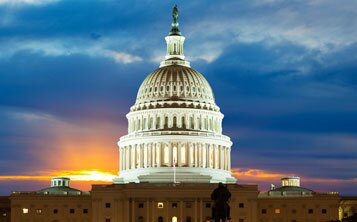
It’s Halloween. Here’s what bankers should fear
Deregulation is back in vogue. The recent congressional vote to overturn the Consumer Financial Protection Bureau’s arbitration rule was arguably the banking industry’s biggest win on Capitol Hill since 2008. At some federal regulatory agencies, industry-friendly appointees have started rolling back the work of their Obama-era predecessors
Banks' stock prices are soaring. And though loan demand remains lukewarm, industrywide profits
Still, a year that began with great promise for the industry could end on a downbeat note if Congress fails to make good on its promise to lower the corporate tax rate or if the North American Free Trade Agreement, which most bankers support, unravels. President Trump is openly feuding with leaders within his own party, and there are growing concerns that regulatory relief legislation, once thought a slam dunk, may not happen.
Meanwhile, a long-time nemesis of big banks is thought to be weighing a presidential run, Silicon Valley is increasingly eyeing the banking business, branches are being spurned by millennial customers and worries over data breaches have hit a new peak.
None of these are ghosts and goblins, but with Halloween upon us, here is a look at some potentially frightening developments that should keep bankers up at night.

The death of tax cuts
But the Republicans, who hold a 52-48 advantage in the Senate, have a thin margin for error. They either need to persuade moderate Democratic senators such as Joe Manchin, D-W.V., and Heidi Heitkamp, D-N.D., to vote for the tax plan, or hold the number of Republican defections to two or fewer. As President Trump continues to stoke feuds with GOP Sens. John McCain, Bob Corker and Jeff Flake, the math looks tricky.
Banks, which currently reap fewer benefits from corporate tax loopholes than many other industries, are likely to be big winners if the tax plan becomes law. But if the GOP plan fails, there’s reason for banks to fear that their stock prices will crash.

More data breaches
The company’s CEO resigned. Its stock price fell by 30% in eight days. Fines and legal settlements
Banks are subject to stricter data security standards than most other companies, but that is hardly a reason to rest easy. It was only three years ago that the names, addresses, phone numbers, and email addresses of 83 million account holders at JPMorgan Chase were compromised.
“I don’t want to throw stones because I also live in a glass house,” the chief information office of a large financial services organization

The unraveling of NAFTA
It is not clear how seriously banks and other U.S. corporations took the threat.
But more recently, U.S. companies have grown more alarmed about the possibility that the trade talks will fall apart, given the hard-nosed positions being taken by the Trump administration.
“We see these proposals as highly dangerous,” John Murphy, senior vice president at the U.S. Chamber of Commerce,

Tech giants get bank charters
The tech behemoths have been nibbling around the edges of the banking business for several years now. For example, Apple Pay has cut into the interchange fees that banks collect, and Amazon has ramped up its lending to small merchants.
If these companies ever managed to obtain a charter, they would pose a formidable challenge even to the largest banks. They not only have a vast amount of data on their users — that’s just about everyone — they also are far better-liked than banks by the general public.
So banks have good reason to worry about

Elizabeth Warren runs for president
She called for the head of Wells Fargo CEO Tim Sloan. She called for the removal of most of Wells Fargo’s board of directors.
She led the ultimately unsuccessful charge to uphold the Consumer Financial Protection Bureau’s arbitration rule, which was loathed by the banking industry.
She introduced legislation
If Warren decides to run for president, she will undoubtedly put an unwanted spotlight on the banking industry. For whatever it’s worth, one Irish betting site lists

Branch traffic declines faster than expected
But the pace at which change occurs is important. If it happens gradually enough, the industry should have time to shift its sales efforts into digital channels. Branches get less traffic today than they once did, but they remain vital as a place to sell banking products.
If the changes happen more rapidly, many banks could be caught flat-footed. Sure, they can cut costs by closing branches and laying off tellers, but the more important task is finding new ways to generate revenue, and that effort will take time.
One study this year projected that

Credit unions get more leeway on membership rules
One hot-button issue is how broadly credit union membership rules should be drawn, with bankers often opposing efforts to loosen the criteria.
Late last year, the American Bankers Association
More recently, NCUA Chairman Mark McWatters argued that Congress should consider relaxing the membership rules much further by allowing credit unions to serve online communities.
“We need to think about how we can create common bonds, or how we can reflect in the Federal Credit Union Act, what people today use as common bonds,” McWatters

A new Fed chief creates market uncertainty
Trump has indicated he will make his final choice this week.
The results could be dramatic and unpredictable. Should Trump pick Yellen, who he has praised in recent weeks, banks won't receive much help in their deregulatory efforts but will benefit from a market that is comfortable with her in charge of the central bank. A choice like Powell might be in a similar vein.
But the markets might react badly to other choices, raising questions about how quickly the Fed will raise interest rates and what the impact would be. Given Trump's penchant for unpredictability, bankers have reason to be nervous.





